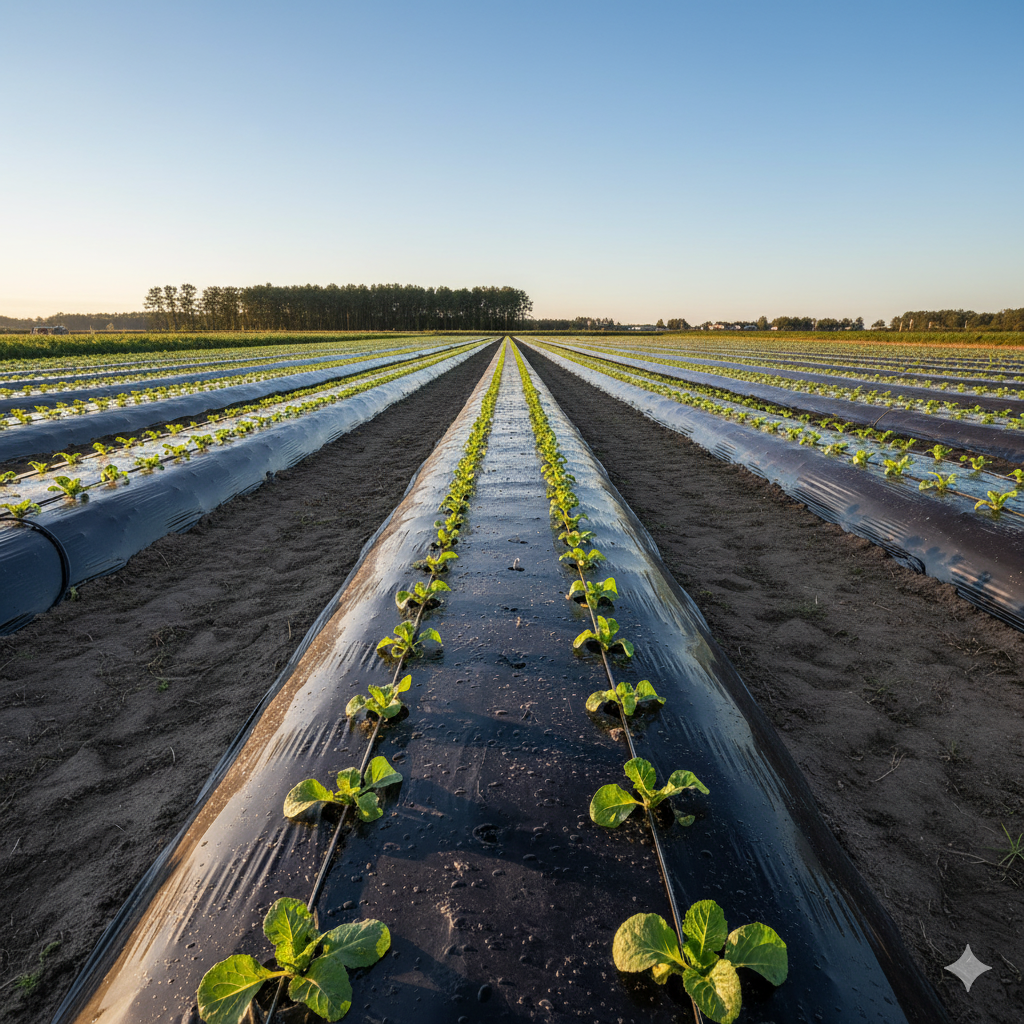Mulching has become one of the most talked-about techniques in modern agriculture — and for good reason. Whether you’re a commercial farmer or a home gardener, understanding the pros and cons of mulching can help you make better crop management decisions.
At Brownfield India, one of the trusted mulch film manufacturers and traders in Indore, we have seen firsthand how mulch films are transforming Indian agriculture — improving soil health, conserving moisture, and enhancing productivity. But like any agricultural practice, mulching has both advantages and limitations.
In this detailed guide, we’ll explore the pros and cons of mulching, explain how different types of mulch films work, and help you decide whether this method suits your farming needs.
What Is Mulching and Why Is It Important?
Before diving into the pros and cons of mulching, let’s understand what it actually means.
Mulching is the process of covering the soil surface with organic or inorganic materials to protect it and improve its fertility. Mulch films — typically made of polyethylene or biodegradable materials — are used to retain soil moisture, regulate temperature, and reduce weed growth.
Farmers and horticulturists across India, especially in regions like Madhya Pradesh, Maharashtra, and Gujarat, use mulch films to improve crop yield and reduce dependency on frequent irrigation.
Brownfield India, a leading mulch manufacturing company in Indore, provides high-quality mulch films designed for various crops such as tomatoes, cucumbers, strawberries, melons, and more.
The Pros of Mulching
When used properly, mulching offers multiple agricultural and environmental benefits. Here are the key advantages of mulching every grower should know:
1. Moisture Retention and Water Conservation
One of the biggest pros and cons of mulching is its ability to retain soil moisture. Mulch films reduce evaporation by covering the soil, ensuring that water stays in the root zone for longer periods.
Benefits for farmers:
- Reduces irrigation frequency
- Saves water and energy costs
- Keeps soil moist even in hot climates
This is particularly valuable in semi-arid regions like Central India, where water scarcity is a recurring challenge.
2. Weed Suppression
Mulching acts as a natural barrier that prevents sunlight from reaching weed seeds, effectively stopping their germination.
Advantages:
- Reduces the need for herbicides or manual weeding
- Helps maintain a cleaner crop field
- Promotes healthier growth by minimizing competition for nutrients
For farmers using mulch films suppliers in Indore like Brownfield India, this means lower maintenance and labor costs during the growing season.
3. Soil Temperature Regulation
Maintaining an ideal soil temperature is crucial for optimal plant growth. Mulch helps in keeping the soil warm during cooler months and cool during hot weather.
Why it matters:
- Encourages early seed germination
- Promotes root development
- Extends the growing season for certain crops
Different colors of mulch films (silver, black, or white) are used depending on climatic conditions and crop type.
4. Soil Erosion Control
Wind and water erosion can significantly damage topsoil. By covering the surface, mulching minimizes erosion and keeps the soil structure intact.
Benefits include:
- Prevents loss of nutrients
- Reduces surface runoff
- Protects soil fertility in the long run
5. Enhanced Crop Quality and Yield
When combined with efficient irrigation systems like drip irrigation, mulch films can substantially improve crop yield and quality.
Results observed by farmers:
- Uniform crop growth
- Reduced fruit rot (by keeping fruits off wet soil)
- Cleaner produce, especially in vegetables and fruits
Farmers partnering with Brownfield India, a trusted mulch film manufacturer, have reported higher yields and reduced crop losses season after season.
6. Improved Soil Health
Organic mulches decompose over time, adding valuable nutrients to the soil. Even inorganic mulch films create a microclimate that supports beneficial soil organisms and root activity.
Key advantage:
- Encourages microbial growth
- Improves soil aeration and structure
- Reduces nutrient leaching
The Cons of Mulching
While the pros of mulching are numerous, it’s equally important to understand its pros and cons of mulching or potential challenges before large-scale adoption.
1. Initial Cost and Installation Effort
Installing mulch films requires investment in material and labor.
Possible drawbacks:
- High-quality mulch films can be expensive for small-scale farmers
- Requires time and precision during installation
- Improper laying can lead to uneven temperature or water distribution
However, when sourced from affordable mulch film suppliers in Indore like Brownfield India, the long-term savings in water, fertilizer, and weed control often outweigh the initial cost.
2. Maintenance and Removal Issues
Inorganic mulch films, particularly plastic ones, don’t decompose naturally. This means they need to be removed and disposed of after use.
Challenges faced:
- Labor cost for removal
- Disposal concerns (especially with non-biodegradable plastics)
- Possible soil contamination if left unmanaged
To address this, many modern mulch manufacturing companies now offer biodegradable mulch films — an eco-friendly alternative that decomposes naturally after use.
3. Pest and Disease Concerns
If not monitored properly, mulching can sometimes create favorable conditions for pests like termites, rodents, or fungal infections.
Preventive measures:
- Use pest-resistant mulch materials
- Maintain proper spacing and ventilation
- Monitor regularly for pest buildup
Choosing the right mulch type and maintaining field hygiene can minimize these risks.
4. Soil Temperature Overheating
While mulch helps maintain soil warmth, in extremely hot regions or during peak summer, dark-colored mulch films (like black mulch) can trap excess heat.
Possible impact:
- Root stress in sensitive crops
- Reduced moisture if ventilation is poor
To solve this, many farmers now use silver or white mulch films that reflect sunlight and reduce overheating — options easily available with Brownfield India, a top mulch film manufacturer and trader in Indore.
5. Limited Nutrient Addition (for Inorganic Mulches)
Unlike organic mulches (such as straw or compost), plastic or polyethylene films do not contribute nutrients to the soil. Therefore, regular fertilization is still necessary.
Tip: Combine mulch films with organic manures or fertigation systems for balanced soil nutrition.
Practical Tips for Effective Mulching
To make the most out of your mulching investment:
- Lay mulch films evenly and tightly to avoid air pockets.
- Combine with drip irrigation for efficient water management.
- Choose color and thickness according to crop and season.
- Dispose of or recycle used films responsibly.
When sourced from experienced mulch film suppliers in Indore like Brownfield India, you also get professional guidance on installation and crop-specific solutions.
FAQ: Common Questions About the Pros and Cons of Mulching
Q1. Which crops benefit most from mulching?
Tomatoes, cucumbers, capsicum, melons, and strawberries respond very well to mulching because it keeps the fruit clean and reduces soil-borne diseases.
Q2. Can mulch films be reused?
Some high-quality mulch films can be reused for multiple seasons if handled carefully, but biodegradable types are designed for one-time use.
Q3. Is mulching suitable for all soil types?
Yes, but proper moisture management is essential in heavy clay soils to prevent waterlogging.
Q4. How does mulching help with weed control?
By blocking sunlight, mulch prevents weed seeds from germinating, significantly reducing weed growth.
Q5. What’s the difference between organic and inorganic mulch?
Organic mulches (like straw or leaves) decompose and add nutrients, while inorganic mulch films are synthetic coverings that mainly help with moisture retention and weed suppression.
Conclusion: Making the Most of Mulching with Brownfield India
Mulching is undoubtedly a game-changer in sustainable farming. While there are both pros and cons of mulching, the benefits — from moisture conservation to higher yield — far outweigh the challenges when implemented correctly.
At Brownfield India, we’re proud to support farmers with durable, eco-friendly, and high-performance mulch films tailored to different crops and climates. Whether you are looking for reliable mulch film manufacturers in Indore or affordable mulch film suppliers, we’re here to help your farm grow smarter and greener.
Take the next step today!
Contact Brownfield India to learn how our mulch solutions can improve your farm’s efficiency, productivity, and profitability.






